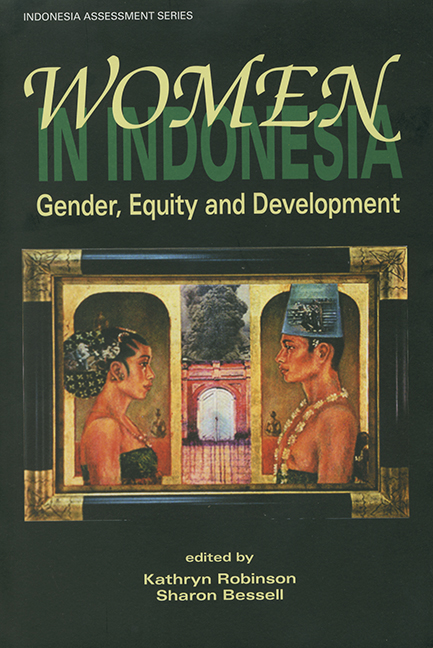Book contents
- Frontmatter
- Contents
- Tables
- Figures
- Contributors
- Acknowledgments
- Glossary
- Prologue
- 1 Introduction to the Issues
- 2 The Mega Factor in Indonesian Politics: A New President or a New Kind of Presidency?
- 3 The Downfall of President Abdurrahman Wahid: A Return to Authoritarianism?
- 4 The Year in Review: From Blind Man's Bluff to Mega Expectations
- 5 Further Comments on the Economy, with a Gender Perspective
- 6 Institution Building: An Effort to Improve Indonesian Women's Role and Status
- Commentary
- 7 Feminism in Indonesia in an International Context
- 8 Gay and Lesbi Subjectivities, National Belonging and the New Indonesia
- 9 And the Winner Is … Indonesian Women in Public Life
- 10 Indonesian Women Artists: Transcending Compliance
- 11 Literature, Mythology and Regime Change: Some Observations on Recent Indonesian Women's Writing
- 12 Women and the Labour Market during and after the Crisis
- 13 Women's International Labour Migration
- 14 Customary Institutions, Syariah Law and the Marginalisation of Indonesian Women
- 15 Women's Grassroots Movements in Indonesia: A Case Study of the PKK and Islamic Women's Organisations
- 16 Women's Activism against Violence in South Sulawesi
- 17 Gender Mainstreaming and Sex-disaggregated Data
- 18 The Changing Indonesian Household
- 19 Women, Family Planning and Decentralisation: New Variations on Old Themes
- 20 Men, Women and Community Development in East Nusa Tenggara
- References
- Index
- INDONESIA ASSESSMENT SERIES
15 - Women's Grassroots Movements in Indonesia: A Case Study of the PKK and Islamic Women's Organisations
Published online by Cambridge University Press: 21 October 2015
- Frontmatter
- Contents
- Tables
- Figures
- Contributors
- Acknowledgments
- Glossary
- Prologue
- 1 Introduction to the Issues
- 2 The Mega Factor in Indonesian Politics: A New President or a New Kind of Presidency?
- 3 The Downfall of President Abdurrahman Wahid: A Return to Authoritarianism?
- 4 The Year in Review: From Blind Man's Bluff to Mega Expectations
- 5 Further Comments on the Economy, with a Gender Perspective
- 6 Institution Building: An Effort to Improve Indonesian Women's Role and Status
- Commentary
- 7 Feminism in Indonesia in an International Context
- 8 Gay and Lesbi Subjectivities, National Belonging and the New Indonesia
- 9 And the Winner Is … Indonesian Women in Public Life
- 10 Indonesian Women Artists: Transcending Compliance
- 11 Literature, Mythology and Regime Change: Some Observations on Recent Indonesian Women's Writing
- 12 Women and the Labour Market during and after the Crisis
- 13 Women's International Labour Migration
- 14 Customary Institutions, Syariah Law and the Marginalisation of Indonesian Women
- 15 Women's Grassroots Movements in Indonesia: A Case Study of the PKK and Islamic Women's Organisations
- 16 Women's Activism against Violence in South Sulawesi
- 17 Gender Mainstreaming and Sex-disaggregated Data
- 18 The Changing Indonesian Household
- 19 Women, Family Planning and Decentralisation: New Variations on Old Themes
- 20 Men, Women and Community Development in East Nusa Tenggara
- References
- Index
- INDONESIA ASSESSMENT SERIES
Summary
There have been significant changes to religious and secular women's organisations in Indonesia as a consequence of political changes since 1998 – the ongoing social and political process known as reformasi (reform). This chapter reports on a case study of the Family Welfare Movement (PKK) and some Islamic women's organisations operating at the grassroots level in the post-Soeharto era. The PKK was for many years considered an important vehicle for the implementation of government development programs in rural areas, in particular through one of its most ‘successful’ programs, the establishment of Posyandu (Integrated Health Posts) in villages across the nation for new mothers, babies and children. Its social networks reached many women nationwide. The issues addressed by the new Islamic women's organisations established only in the last two decades are quite different from the traditional concerns of the older Islamic organisations, and also of the PKK.
Recent political changes have generated the question as to whether New Order institutions like the PKK and Posyandu remain viable: can they continue to act as the machinery of development, and are they still capable of carrying out their programs? If so, what elements have contributed to their survival? If they do wither away, will the Islamic women's organisations – especially those associated with the two major Islamic organisations, Nahdlatul Ulama (NU) and Muhammadiyah – be able to take their place and support development from below at the grassroots level? If not, what other kinds of organisations can best fulfil the needs of women in rural areas?
Many of the once strictly social Islamic organisations are now also political institutions. The election of the leader of the NU, Abdurrahman Wahid, as president in 1999, and of Amien Rais, Muhammadiyah's representative, as speaker of the People's Consultative Assembly (MPR), points to the growing political power and influence of Islamic groups in Indonesia. One of the most notable developments has been the entry of the NU and Muhammadiyah into the political arena as powerful and fully fledged political parties. Under the New Order these had become principally social organisations with an Islamic background, although together their membership totalled around 50 million. Since 1999, however, they have been positioned at the centre of political power. Consequently, the women's organisations affiliated with the NU and Muhammadiyah – Muslimat, Fatayat and Aisyiyah – have also come to occupy an important and potentially powerful position.
- Type
- Chapter
- Information
- Women in IndonesiaGender, Equity and Development, pp. 187 - 197Publisher: ISEAS–Yusof Ishak InstitutePrint publication year: 2002

